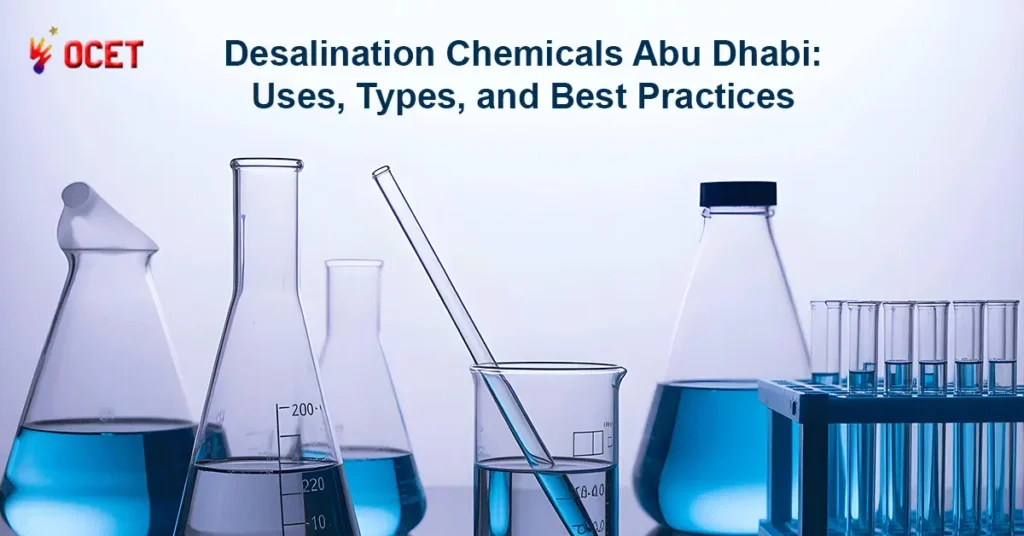Desalination Chemicals Abu Dhabi are essential to efficiently treat seawater to generate drinking water compatible for use and industrial applications. In a place like Abu Dhabi, where freshwater is limited, desalination is an important technology, and proper application of water treatment chemicals provides maximum system performance, longevity, and quality of water. Water Treatment Chemicals Abu Dhabi not only facilitate desalination but also protect equipment and comply with regulations. This article discusses the various types of desalination chemicals, their uses, selecting the appropriate chemicals for reverse osmosis (RO) systems, best practices in maintenance, leading suppliers, and applicable regulations.
Types of Desalination Chemicals and Their Applications
Desalination operations make use of a number of significant chemical products to condition and shield the raw seawater supply and product water. The primary types of desalination chemicals are:
- Antiscalants: These prevent scaling like calcium carbonate, calcium sulfate, and silica deposition on membrane surfaces in RO plants. Proper selection of the antiscalant prolongs membrane life and sustains flow rates.
- Biocides and Disinfectants: Microbial growth, biofilms, and algae are controlled by these chemicals that can clog membranes and decrease system efficiency. Chlorine-based and non-oxidizing disinfectants are typical biocides.
- pH Adjusters: Base or acid is added to allow for optimal water pH for effective desalination and for the prevention of scale and corrosion.
- Corrosion Inhibitors: Prevent metal system components from corrosive seawater and chemicals to ensure pipeline and equipment longevity.
- Cleaning Chemicals: Alkaline cleaners, acid cleaners, and detergents are specialized cleaning chemicals applied during routine membrane cleaning to restore permeability and eliminate fouling contaminants.
- Coagulants and Flocculants: Applied primarily in pretreatment to clump suspended particles and colloids so that they can be easily removed during filtration processes.
These chemicals play a key role in membrane-based RO desalination and non-membrane heat-based desalination processes such as Multi-Stage Flash (MSF) and Multiple Effect Distillation (MED) that are prevalent in the UAE.
How to Select the Proper Chemical for Your Reverse Osmosis System
Proper selection of the correct desalination chemicals is vital for best-in-class RO system performance. Parameters to be considered are:
- Feedwater quality: Measure the salinity, hardness, silica, and microbial content of seawater to decide on the required chemical type and dose.
- Compatibility: Promote membrane and system material compatibility with chemicals to prevent corrosion or reduced performance.
- Dose optimization: Precise dosing inhibits under-treatment resulting in fouling or over-treatment that results in wastage of chemicals or corrosion.
- Environmental and regulatory compliance: Select chemicals that meet Abu Dhabi water quality standards as well as environmental requirements.
- Supplier expertise: Use experienced suppliers who offer technical support and customized chemical formulations.
Correct pretreatment with coagulants and then proper antiscalants and biocides minimize fouling and scaling, hence ensuring RO membrane life and minimizing downtime.
Keeping Equipment in Proper Conditions with Correct Chemical Application
Equipment maintenance of desalination through proper chemical management includes:
- Constant monitoring of chemical feed rates and water chemistry values such as pH, conductivity, and microbial counts.
- Regular membrane cleaning through specific chemical cleaning procedures (CIP – Clean-In-Place) that treat fouling mechanisms like organic, biological, or scaling deposits.
- Regular pump, valve, and piping inspection to identify corrosion or deposit starting points early.
Chemical handling and storage that meet safety standards to ensure chemical quality and operators’ safety.
Operations teams training on best practice for chemical usage and emergency response.Application of these best practices ensures uniform water product quality, maximizes equipment life, minimizes operating expenses, and prevents unscheduled downtimes.
Leading Local and Overseas Suppliers in UAE
OCET Gulf stands out as a premier supplier of desalination and water treatment chemicals in the UAE, catering to both local and overseas clients with exceptional expertise and industry leadership. The company offers a broad portfolio of high-performance chemicals, including antiscalants, biocides, pH adjusters, corrosion inhibitors, coagulants, flocculants, and specialty chemicals suited for a variety of applications such as reverse osmosis (RO) systems, wastewater treatment, cooling towers, and industrial processes.
With over a decade of experience in chemical distribution and technical support, OCET Gulf is committed to quality, innovation, and customer satisfaction. Their products meet stringent international standards and are sourced from trusted global manufacturers, ensuring reliability and compliance for critical water treatment operations in the UAE. OCET Gulf’s dedicated team provides comprehensive service—including guidance on product selection, dosage optimization, regulatory compliance, and after-sales technical support—making them a trusted partner for both industrial and municipal clients seeking advanced water management solutions.
By focusing on performance, sustainability, and meeting the unique demands of the region’s water sector, OCET Gulf has established itself as a leading supplier for desalination chemicals, supporting Abu Dhabi’s water security initiatives and infrastructure development.
Abu Dhabi Regulations and Standards for Desalination Chemicals
The water quality rules in Abu Dhabi are stringent, mirroring WHO and GCC standards to ensure public health. The Department of Energy (DoE) regulates:
- Pre-approval of chemical substances before they are used for drinking water treatment.Application in conformity with guidelines to prevent chemicals from contaminating water wholesomeness.
- Monitoring requirements such as trial periods and comprehensive efficacy reporting.Compliance with Abu Dhabi Quality and Conformity Council (QCC) standards and product certifications like Abu Dhabi Trustmark.
- Environmental discharge quality regulations controlling pollutant concentrations in effluents.
- The legislative structure provides environmentally friendly desalination operations with high-quality water. Suppliers and operators have to remain updated and follow stringent standards.
Conclusion
Desalination Chemicals Abu Dhabi are indispensable in today’s water-scarce environment. Understanding the types and applications of these chemicals, alongside selecting the right products and following best maintenance practices, significantly impact desalination plant efficiency and water quality. In Abu Dhabi’s well-regulated market, partnering with knowledgeable suppliers and adhering to local regulations further guarantees sustainable and safe water treatment solutions. This synergy of advanced chemical use, equipment upkeep, and regulatory compliance propels Abu Dhabi’s leadership in water security innovation.
